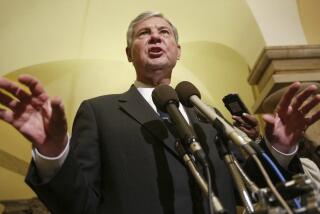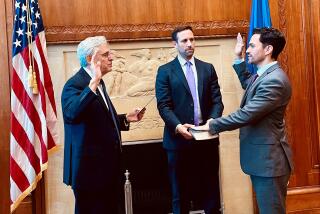To Head Iran-Contras Inquiry : Watergate Showed Inouye to Be an Effective Prober
- Share via
WASHINGTON — Under the glaring television lights in the packed, stifling Senate caucus room, the witness was not giving an inch.
Nobody in the White House did anything wrong, he insisted--all the burglaries, wiretaps and deceptions involved in the labyrinthine Watergate affair were justified by presidential prerogative and the national security.
“Every act on your part was legal, proper and ethical?” asked the senator from Hawaii, Daniel K. Inouye, soft spoken as always.
Combative Sparring
“That is my belief, and I trust that is true,” replied John D. Ehrlichman, the Nixon aide whose combative sparring with the select Senate committee investigating Watergate during the summer of 1973 turned the hearing into high drama.
“If that is the case,” Inouye continued, “why did the attorney general of the United States cite your resignation as evidence of the President lowering the boom?
. . . If you are clean, why did he fire you? . . . Why didn’t he insist that you stay on board?”
Inouye, his time for questioning expired, leaned back in his chair. And, as the next senator took the floor, onlookers and a nationwide television audience heard a voice muttering in an intonation very like Inouye’s: “What a liar.”
Deadly Instinct
Inouye emerged from Watergate with a reputation as a polite interrogator with a deadly instinct for the nub of an issue. Now, 13 years later, he is chairman of a new select Senate panel that will investigate the Iran- contras episode.
At 62, the once-precocious Democrat from Hawaii has become the state’s senior elected politician. He is a quiet, thoughtful lawmaker with strong liberal credentials and a reputation as a party loyalist, and he rarely makes waves.
A few years after Watergate, as chairman of the Senate’s watchdog committee to oversee the CIA during a period of scandal in the nation’s intelligence community, Inouye managed the sensitive assignment with a maximum of discretion and a minimum of showboating. Indeed, his biggest headline of the episode may have been on the announcement that he had yielded to Majority Leader Mike Mansfield’s entreaties and accepted the job.
In his quiet way, Inouye has become an important behind-the-scenes power among Senate Democrats. He has been secretary of the Democratic Conference, equivalent to the No. 3 position in the party leadership.
Good Rating From ADA
And he has received solid, if not ecstatic, approval ratings from such interest groups as organized labor, Americans for Democratic Action and the American Civil Liberties Union.
In the 1960s, Inouye supported the Lyndon B. Johnson Administration’s conduct of the Vietnam War a bit longer than was deemed appropriate by the liberal wing that dominated the party after 1968--when Inouye made his first bid for national prominence as a keynote speaker at the chaotic Democratic National Convention in Chicago.
Years later, he again broke temporarily with party orthodoxy on a security issue and supported President Reagan’s military aid to El Salvador--until early 1983, when he changed course on a key vote. However, he has opposed aiding the Nicaraguan rebels.
Decorated Veteran
Inouye is a much-decorated veteran of World War II, in which he enlisted as a private in the 442nd Infantry Regimental Combat Team, a legendary unit formed exclusively of Japanese-Americans. Toward the end of the war, Inouye, by then a platoon leader with a battlefield commission, led his platoon in the destruction of three German machine-gun nests. He was shot in the stomach at the start of the action and was hit again during the assault. His right arm, shattered, had to be amputated.
Inouye, who was born in Honolulu, received a law degree after the war, returned to Hawaii and immediately went into politics. After a stint in the House, he was elected to the Senate in 1962.
More to Read
Get the L.A. Times Politics newsletter
Deeply reported insights into legislation, politics and policy from Sacramento, Washington and beyond. In your inbox twice per week.
You may occasionally receive promotional content from the Los Angeles Times.










